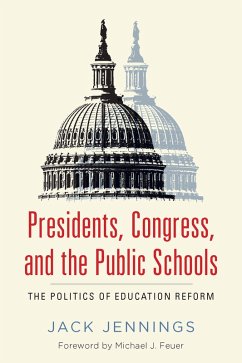
An Education in Politics (eBook, ePUB)
The Origins and Evolution of No Child Left Behind
Versandkostenfrei!
Sofort per Download lieferbar
9,95 €
inkl. MwSt.
Weitere Ausgaben:

PAYBACK Punkte
5 °P sammeln!
Since the early 1990s, the federal role in education-exemplified by the controversial No Child Left Behind Act (NCLB)-has expanded dramatically. Yet states and localities have retained a central role in education policy, leading to a growing struggle for control over the direction of the nation's schools. In An Education in Politics, Jesse H. Rhodes explains the uneven development of federal involvement in education. While supporters of expanded federal involvement enjoyed some success in bringing new ideas to the federal policy agenda, Rhodes argues, they also encountered stiff resistance fro...
Since the early 1990s, the federal role in education-exemplified by the controversial No Child Left Behind Act (NCLB)-has expanded dramatically. Yet states and localities have retained a central role in education policy, leading to a growing struggle for control over the direction of the nation's schools. In An Education in Politics, Jesse H. Rhodes explains the uneven development of federal involvement in education. While supporters of expanded federal involvement enjoyed some success in bringing new ideas to the federal policy agenda, Rhodes argues, they also encountered stiff resistance from proponents of local control. Built atop existing decentralized policies, new federal reforms raised difficult questions about which level of government bore ultimate responsibility for improving schools.
Rhodes's argument focuses on the role played by civil rights activists, business leaders, and education experts in promoting the reforms that would be enacted with federal policies such as NCLB. It also underscores the constraints on federal involvement imposed by existing education policies, hostile interest groups, and, above all, the nation's federal system. Indeed, the federal system, which left specific policy formation and implementation to the states and localities, repeatedly frustrated efforts to effect changes: national reforms lost their force as policies passed through iterations at the state, county, and municipal levels. Ironically, state and local resistance only encouraged civil rights activists, business leaders, and their political allies to advocate even more stringent reforms that imposed heavier burdens on state and local governments. Through it all, the nation's education system made only incremental steps toward the goal of providing a quality education for every child.
Rhodes's argument focuses on the role played by civil rights activists, business leaders, and education experts in promoting the reforms that would be enacted with federal policies such as NCLB. It also underscores the constraints on federal involvement imposed by existing education policies, hostile interest groups, and, above all, the nation's federal system. Indeed, the federal system, which left specific policy formation and implementation to the states and localities, repeatedly frustrated efforts to effect changes: national reforms lost their force as policies passed through iterations at the state, county, and municipal levels. Ironically, state and local resistance only encouraged civil rights activists, business leaders, and their political allies to advocate even more stringent reforms that imposed heavier burdens on state and local governments. Through it all, the nation's education system made only incremental steps toward the goal of providing a quality education for every child.
Dieser Download kann aus rechtlichen Gründen nur mit Rechnungsadresse in A, D ausgeliefert werden.













